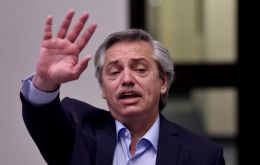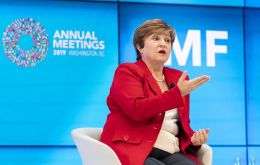MercoPress. South Atlantic News Agency
Tag: International Monetary Fund
-
Monday, January 13th 2020 - 09:30 UTC
Argentine president puts a deadline to renegotiates public debt: March 31

President Alberto Fernandez said he has set a March 31 deadline to renegotiate Argentina’s rampant public debt and that a more “innovative” International Monetary Fund approves of the direction his government is taking.
-
Friday, January 10th 2020 - 09:57 UTC
Buenos Aires province US$ 227 million debt payment on Jan 26, a major test for creditors

Argentina's debt talks will face their first big test this month with a US$ 277-million payment due on a Buenos Aires provincial bond, seen as a gauge of how the indebted nation's new government will handle its creditors.
-
Friday, January 3rd 2020 - 09:54 UTC
Argentina issues Treasury Bills, subscribed by the Central bank, to pay creditors

Argentina's new government announced the issuance of US$ 1.326 billion of dollar-denominated Treasury Bills, to be directly subscribed by the central bank, according to a decree in the Official Gazette on Thursday.
-
Saturday, December 28th 2019 - 09:55 UTC
Argentina will continue to honor its debt, and has cleared all 2019 payments

The Argentine government will continue to honor its debt while it works to reach an agreement with creditors, both the IMF and private bond holders, with the purpose of refinancing commitments and achieve a long term sustainable path for the payments, according to sources from the Economy ministry.
-
Wednesday, November 27th 2019 - 09:55 UTC
Alberto Fernandez renounces to IMF loan: “I want to stop asking for money”

Argentina's president-elect Alberto Fernandez said on Tuesday he would renounce the remaining US$11 billion tranches of the country's International Monetary Fund loan as soon as he takes office next month.
-
Friday, November 1st 2019 - 09:58 UTC
Argentina imposes more money exchange restrictions to defend reserves

Argentina’s central bank is setting a price floor under the volatile peso in hopes to avoid a sharp plunge in the currency after an opposition-won presidential election last Sunday shifted the country firmly back to the left.
-
Friday, October 25th 2019 - 04:00 UTC
Uruguay’s wealth management specialist booming under Argentine financial issues

Argentina has been facing significant financial issues in the last decade, and Uruguay wealth management teams are poised to take advantage.
-
Friday, October 18th 2019 - 10:55 UTC
New IMF chief pledges full support for Argentina, but will wait for election results

The International Monetary Fund will stand by Argentina as it works through its economic crisis, Managing Director Kristalina Georgieva said on Thursday. She added that the Fund was waiting to see the future policy framework adopted by Argentina, which holds an election later this month in which a change of government is widely predicted.
-
Thursday, October 17th 2019 - 09:54 UTC
September inflation in Argentina reaches 5.9% and 53.5% in twelve months

Argentina consumer prices rose 5.9% in September, the country’s statistics agency said on Wednesday, the sharpest jump in a year amid a flaring economic crisis in Latin America’s no. 3 economy. That brought year-to-date inflation to 37.7%, the National Institute of Statistics and Censuses (INDEC) said, while rolling 12-month inflation was running at 53.5%.
-
Monday, October 14th 2019 - 09:56 UTC
Peace in Ecuador: Government and protestors strike a deal; sharp rise in fuel prices suspended

President Lenin Moreno and leaders of Ecuador's Indigenous peoples struck a deal late Sunday to cancel a disputed austerity package and end nearly two weeks of protests that have paralyzed the economy and left seven dead.
